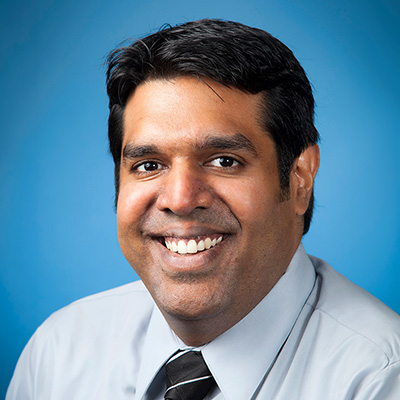
August 2024
Sunil Raikar’s research focuses on developing novel therapeutics for pediatric blood cancers through cell and protein engineering. One focus in his lab is developing chimeric antigen receptor (CAR) T cells, a form of immunotherapy in which he genetically modifies immune cells to get redirected towards a cancer cell. This has worked well in B-cell acute lymphoblastic leukemia, and the lab's focus is to expand this technology towards acute myeloid leukemia (AML) and T-cell acute lymphoblastic leukemia (T-ALL), which are more challenging to treat once patients relapse. Dr. Raikar’s specific interest lies in using a unique type of immune cell called gamma delta T cells for cancer eradication. For the CAR T cell work, the research process is called cell engineering. Here, blood is collected from either healthy donors or a patient, immune cells are isolated and then genetically modified to express the CAR receptor. Typically, this is done by using a technology called lentiviral vectors. After the cells are modified, they get infused back into the patient. Dr. Raikar is working to test different targets and hopes to identify and develop a CAR T cell product against a specific target, both for AML and T-ALL. The goal is to eventually move this research into a clinical trial in the near future.
Another focus of his research looks at protein engineering, where his lab is trying to create a novel form of a chemotherapy drug called L-asparaginase. Through this collaboration with Dr. Christopher Doering, the researchers are using a novel protein drug optimization platform called ancestral sequence reconstruction (ASR) to develop a more humanized form of L- asparaginase that they hope will have reduced toxicity compared to the current available drugs. Finally, he has an interest in studying mixed phenotype acute leukemia (MPAL), an extremely rare kind of blood cancer that is a combination of both acute myeloid leukemia and acute lymphoblastic leukemia, the two most common types of leukemia that we see in children. Understanding its biology and developing therapeutics towards this rare form of cancer is also an important mission in Dr. Raikar’s lab.
Dr. Raikar’s interest in cancer research started in 2013 during his pediatric hematology/oncology fellowship when he had an opportunity to work with Dr Trent Spencer. He says, “it seemed like a once in a lifetime opportunity from a timing standpoint to be involved in CAR T-cell research. Once I got in the lab, despite some initial struggles, I really got excited about the ability to take an idea then use science to develop a potential therapeutic product. The end goal is trying to treat patients. It’s a very different experience from taking care of patients clinically, but I felt like it was just very fascinating to see how technology can be used to develop new drug products. Our research program is very translational. We are mainly focused on developing therapeutics. I think as a physician-scientist, it's nice to be able to be that bridge between the clinical side and the research side. I have definitely enjoyed that process a lot.”
Another focus of his research looks at protein engineering, where his lab is trying to create a novel form of a chemotherapy drug called L-asparaginase. Through this collaboration with Dr. Christopher Doering, the researchers are using a novel protein drug optimization platform called ancestral sequence reconstruction (ASR) to develop a more humanized form of L- asparaginase that they hope will have reduced toxicity compared to the current available drugs. Finally, he has an interest in studying mixed phenotype acute leukemia (MPAL), an extremely rare kind of blood cancer that is a combination of both acute myeloid leukemia and acute lymphoblastic leukemia, the two most common types of leukemia that we see in children. Understanding its biology and developing therapeutics towards this rare form of cancer is also an important mission in Dr. Raikar’s lab.
Dr. Raikar’s interest in cancer research started in 2013 during his pediatric hematology/oncology fellowship when he had an opportunity to work with Dr Trent Spencer. He says, “it seemed like a once in a lifetime opportunity from a timing standpoint to be involved in CAR T-cell research. Once I got in the lab, despite some initial struggles, I really got excited about the ability to take an idea then use science to develop a potential therapeutic product. The end goal is trying to treat patients. It’s a very different experience from taking care of patients clinically, but I felt like it was just very fascinating to see how technology can be used to develop new drug products. Our research program is very translational. We are mainly focused on developing therapeutics. I think as a physician-scientist, it's nice to be able to be that bridge between the clinical side and the research side. I have definitely enjoyed that process a lot.”

